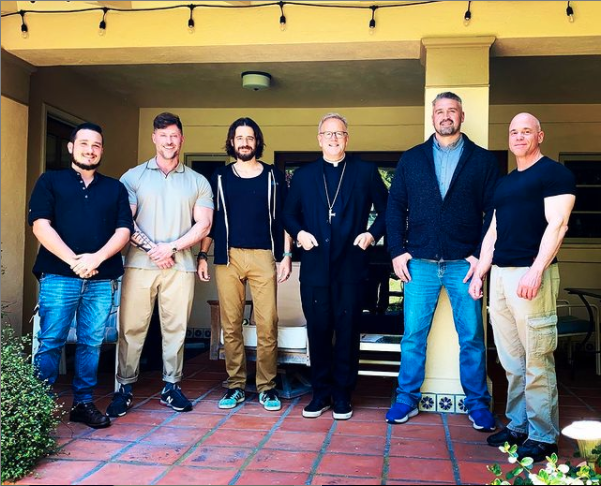
Sexual Misconduct and Employee Intimidation at Word on Fire
April 30, 2022
Resigning employees call for change amid Word on Fire controversy
May 13, 2022| By: | Chris Damian |
As I’ve shared the story of sexual misconduct and employee intimidation at Word on Fire, a number of women have reached out to me to share their stories. Most have focused on sexism, comments that could constitute sexual harassment, misogyny, and “bro culture.” For example, one woman shared:
“Thank you so much for the WOF article. I spent a little time at WOF with the aggressor present, and booked a flight to leave sooner than planned because of how uncomfortable the situation was-only men in the office and the weirdest conversations. Constant (graphic) talk about only being open to marrying women who were virgins with hymens in tact, dreams of smoking cigars with the boys while their wives gave birth, and so much mockery of any person or organization in the church that had ever criticized BB or the WOF organization. There’s a lot more but it’s honestly uncomfortable to revisit. Also please keep my identity completely private as the power they have is truly frightening.”
Another woman shared a similar story, of having interactions with Word on Fire staff where Gloor would make sexually inappropriate comments in the presence of both Grunow and Barron, and where neither would correct Gloor. Workplace hostility towards women does not seem to be an issue isolated to Gloor, Grenow, and Baron, however.
Consider yet another woman, who had been offered a position at Word on Fire which was rescinded after she asked for a higher salary. She told me:
“Several people sent me this article because a few months ago WOF offered me a very prominent/public-facing job working for them, but then things got weird when I negotiated and they rescinded the offer. I had concerns about coming into their organization as a woman in a higher up position since there are almost no women in leadership (I had three interviews with four people total and no women in any of those) and now I feel that I dodged a huge bullet.
There were all quite unprofessional in the hiring process (I say this having worked both in corporate world and Catholic nonprofit) and there was not any official HR person to my knowledge, so I’m not surprised to hear how all this is being handled internally.
… That there wasn’t an HR person was a concern for me. The person running operations was handling the HR stuff and to my knowledge has no HR experience or training.
My perception of why the offer was pulled was that I was an assertive woman coming in knowing what my skills were worth and I asked for what my skills were worth (knowing that the salary I was asking for was less than the men who were higher up the chain because those numbers are available on tax returns). I think they were a bit threatened by a woman who defied social expectations of how a Catholic woman is supposed to act. On the list of highest paid people in the company – no women on the list from what I recall. And there was only one woman I think on the board (again I can’t remember exactly but if you Google Word on Fire IRS form 990) all that info is there
I was also asked my current salary during the process which is ILLEGAL in the state from which the person interviewing me was located. That was a red flag for me. Anyone doing hiring should KNOW labor laws in their state.”
As I wrote previously, it’s almost a punchline that all of Word on Fire’s top employees have been men, with the one exception of their secretary:
A resignation
I also spoke with a woman who resigned from Word on Fire after the October staff meeting. She said that she left for two primary reasons: “morality” and “safety.” She said that she did not want to be “complicit” with what was happening, and that she has not regretted her decision to leave. She shared with me:
“Often, the work at Word on Fire seemed to be more oriented to pulling followers toward Bishop Barron, rather than Christ… He felt more like a celebrity than a pastor, even to me on his staff… [W]hile I enjoyed my work and coworkers, it was clear that continuing to work there was not good for my soul, nor the souls of those who were impacted by my work at Word on Fire.”
Her other primary concern was over safety:
“To put it bluntly, I do not feel that if I had been one of the victims, I would have been protected in any way. I also do not trust that if I were to be a victim in the future, Bishop Barron or Father Steve would view sexual assault in a way which would be sympathetic to a victim.
From the beginning, it was clear that my safety was not prioritized. It was common knowledge that Joe was not trustworthy with women… [P]eople openly discussed the extreme favoritism that he received from Bishop Barron and Fr. Steve. He got away with more, and he did what he wanted. Even his blog, which has since been removed, discussed marriage as a conquest… The first time I spoke to Joe in person, he asked me if I was married within a few minutes of speaking.”
She shared that Gloor did not respect boundaries. With this woman, he would text her personal number rather than message her using the employee Slack or email accounts. Gloor did this, even when he was asked to use Slack or email. She shared that this may be something small, but that this is just “one example of how Joe pushed boundaries and lines, and Fr. Steve allowed it (but only for him)… It felt like a slippery slope.”
She was also “incredibly bothered” by the way in which Bishop Barron spoke during the October staff meeting:
“As a survivor of sexual abuse myself, it was horrifying to see Bishop discuss these serious matters in the way in which he did. This call did not appear to be rehearsed, which made it all the worse—these were his genuine thoughts regarding the matter. The women were simply accusers, and Joe’s reputation needed to be prioritized over them. He needed to be prioritized over their privacy, over their testimonies, and over the safety of our coworkers (which was made clear when we found that Fr. Steve had threatened other employees who asked about what had happened to Joe).”
At the time, she worried about whether one of the women was a member of the staff. She said:
“It is horrible to think that if one of them had been me, I would have simply been called ‘an accuser,’ even after it was made clear that these were not false accusations.”
She said she is proud of her decision to leave, and she feels “relieved to have left an environment in which my safety would have come second to the reputation of a man many of us knew to be misogynistic and unsafe.”
Indeed, according to another source, Bishop Barron disclosed the name of a victim to his staff without her consent, compromising her safety. And another former Word on Fire staff member questioned whether Grunow shared information with Gloor, leading Gloor to go to the victim’s home:
The bodybuilder thing
The recent allegations against Gloor are not the only controversy he has brought to Word on Fire. The hiring and promotion of Gloor into Word on Fire’s highest-paid position raised many eyebrows, given that he was relatively unexperienced in ministry work and previously had been known primarily for being a fitness spokesmodel on MTV. This drew scrutiny from some.
But Gloor was only the beginning. Word on Fire’s current CEO Fr. Steve Grunow also received criticism for posting photos of himself flexing in tank tops. Indeed, gym photos and bicep flexing are becoming more and more common for American celebrity priests and ministry leaders. Many have scrutinized the predominance of weightlifters on the Word on Fire staff. Some have taken this to accuse Barron and others of being gay. They ask: is Barron surrounding himself with muscular men because of his sexual attractions?
Even setting aside the homophobic undertones of such a question, there may be an easier answer: a toxic ideal of masculinity driving misogyny and the subjugation of women. Toxic dynamics may be arising at Word on Fire because of a culture that idealizes a spiritualized MTV ideal of masculinity, one where a large muscular man obtains a young “pure” wife. Catholic organizations fail to recognize these problems, in part, because they insist on reading sexual scandals, such as the one involving Gloor, through the lens of “chastity.” This lens helps preserve a misogynistic culture and fails to get at the root of the problem.
Indeed, one theme that has come up in Word on Fire materials is the idea that women want too much. Word on Fire in the past has positioned itself as decidedly anti-feminist. Recall how Bishop Barron critiqued the first Star Wars film to feature a female protagonist:
“[T]he mythic and archetypal dimensions [of the previous films] are all but overwhelmed by an aggressively feminist ideology. The overriding preoccupation of the makers of the most recent Star Wars seems to be, not the hero’s spiritual journey, but the elevation of the all-conquering female.”
He does write later in the review:
“Now don’t get me wrong: I fully understand why, in our cultural context today, women are feeling the need to assert themselves and to put powerful men in their place. I even see why a certain exaggeration is inevitable.”
One might see this as a support for women being more assertive today. But It’s important to note that Barron says that women are “feeling” a need to assert themselves, rather than saying that women have a need to assert themselves. Indeed, this female protagonist who captivated so many bore Barron so much that, he admits, he fell asleep for ten minutes of the film. Most of his review complains about the men being too weak and the women being too strong. It is difficult not to read all this as related to the institutional and cultural problems at Word on Fire. Here, the toxic and misogynistic dynamics come out into the public ministry as well.
Chastity and violence
A concern about “chastity” plays a role in these dynamics as well. One might be tempted to read, for example, Gloor’s predatory sexual language and behavior through the lens of chastity, arguing that the issue is primarily a failure to properly moderate and integrate sexual desire. This would be a fatal mistake. It fails to address the issue, and drives men like Gloor to seek solutions that ultimately lead nowhere. And it results in the institution waving away any systemic and cultural problems, reducing the issue to a single man and his desires.
Consider a similar issue: misconceptions when it comes to domestic violence. Some believe that domestic violence occurs because of a partner’s inability to control their anger. Recent developments in psychology, however, make a contrasting claim. As Susan Mitchell, a licensed social worker, writes:
“In comparing domestic violence and anger, there are several key differences. Domestic violence is the result of the need to control and gain power in a relationship – it is not uncontrollable anger. The abusive person has a belief that they are entitled to power and control to the point that they often totally disregard the feelings of their partner. This desire to have all the control over someone else often masks feelings of inadequacy, guilt, low self-esteem, or fear of abandonment.”
That is, domestic violence isn’t really about anger. It’s about a warped worldview and the habits and dispositions that result from it. Similarly, Psychologist Steven Stosny argues that batterers harm the people they’re closest to because they have too little compassion. They need to better understand and relate to the people around them. In the case of Gloor, Grunow, Barron, and Word on Fire, there seems to be a failure to really respect and empathize with the experiences of women.
In addition, Stosny argues that for abusers, one key issue is a fragile sense of self and the need for others for regulation. He writes, “If your only form of self-regulation has to come from other people, then you are going to get pretty manipulative of them to get it.” This is an important point for those who grew up in certain forms of purity culture, where women were expected to regulate men’s passions by the way women dress, speak, and act. If Stosny is right, then these expectations may be fostering environments where abusive views, dispositions, and behaviors can develop.
Abusive dynamics are particularly visible in Gloor’s discussions with staff. According to multiple women I have spoken with, one topic of discussion that Gloor would encourage at Word on Fire is the topic of women’s hymens. Gloor and others seemed to hold the view that a woman’s hymen would be “intact” until sexual penetration, which would “break” the hymen. Despite his own sexual history, Gloor wanted a woman with an “intact” hymen, which would be evidence of her virginity. Prior to modern medicine, with its focus on better understanding female biology, this was a common view. Even medieval devotions to Mary held that her hymen was intact as a sign of her virginity. Today, however, commitments to better understand women’s bodies has helped us to understand that this is a myth, rather than a fact. The hymen is not rigid and penetrable. As Dr. Jonathan Shaffir, MD, writes:
“Though there are many instances where women do experience a small amount of bleeding from hymenal tearing at first intercourse, this is by no means a universal experience, as there are many women who have very little tissue there in the first place.”
The “breaking” of a hymen upon vaginal intercourse does not have a basis in the actual female body. Rather, its basis is in a false understanding of women that has been preserved in the minds of men seeking to have a fetishized approach to sexual intercourse. Indeed, the desire to break a woman’s hymen is especially misogynistic. Not only does it represent a false understanding of the female body. It also holds that part of what is desirable in a woman is, quite literally, to “break” her in a way she has not been broken before. It’s a view oriented towards abuse.
Rhetoric surrounding “chastity,” virginity, and sexual purity were central to the toxic dynamics at Word on Fire. This focus belittled and harmed women. From a process lens, a focus on chastity also helps to ensure that investigations into these issues are not victim-centered. To make the issue about chastity ensures that the focus stays on the perpetrator, while the victim fades into the background. It scrutinizes the subjective motivations and personal actions of the perpetrator, rather than the harms and impacts to the victim. It also keeps the perpetrator from seeing the victim: obsessing over his own “chastity” can function to distract him from the harms suffered by others.
This all helps us to understand that these issues with Gloor and Word on Fire are not really about chastity. They’re about justice. They’re about violence. They’re about misogyny that has been allowed to persist in the organization and impact women both within and outside of it.
The root of the problem
All this also helps to clarify how this is a problem of perspective, ideology, empathy, and compassion. One can see the connecting line between Bishop Barton’s apparent lack of empathy for victims, Gloor’s misogynistic comments about women at Word on Fire, the occurrence of employee intimidation, the lack of pay and level gender equity at Word on Fire, and Gloor’s apparent sexual harassment and abusive behavior. These dynamics and events are mutually supportive.
The impact of these toxic dynamics is the myriad of harms against women that are coming to light. Simply responding directly to those harms will not fix the problem. These problems will persist if these harms are treated as isolated incidents by just one individual. Instead, these harms are the complex result of a myriad of conditions all of which need to be addressed. This is a top-to-bottom issue which requires a comprehensive examination of conscience and a consideration of how some (or much) of the “good work” of Word on Fire may be tainted by—and may have contributed to—these issues.
And these issues continue. According to one source, Douglas Cummins has replaced Joe Gloor as executive producer at Word on Fire. When women were complaining about the misogyny and lack of accountability at Word on Fire, he used his personal company’s Instagram account to shoot back at them: “Grow up.”




